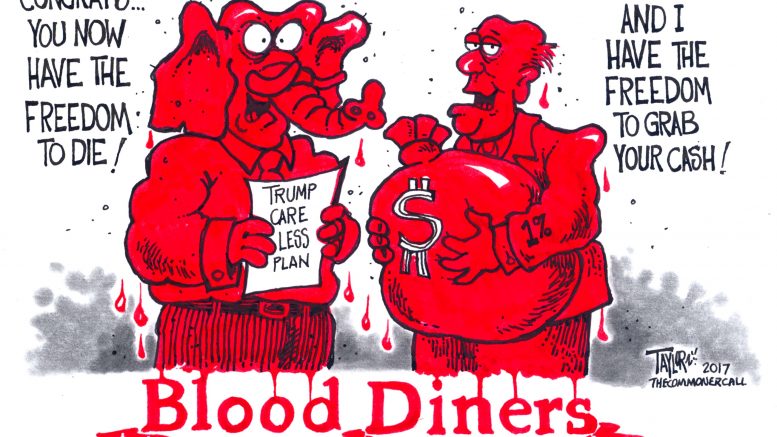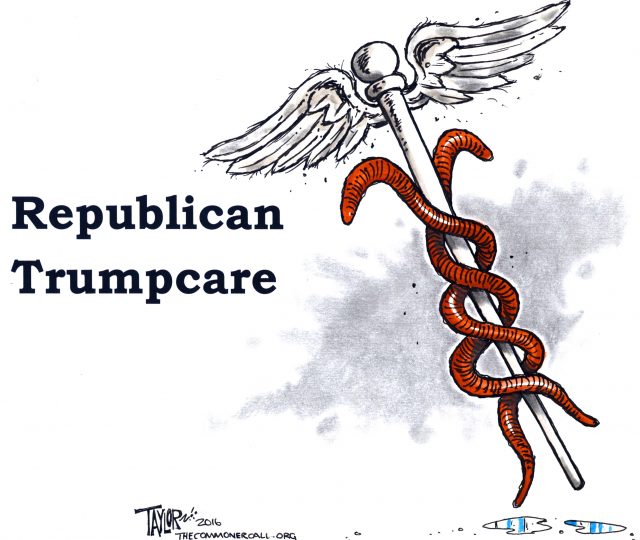
Elizabeth Warren Says Key Thing to Know About Trumpcare Bill: ‘This Is Blood Money’
Common Dreams (6/23/17)
Sen. Elizabeth Warren (D-Mass.) has now read the Republican bill that would repeal and replace the Affordable Care Act and says that it contains “one flashing neon light after another” that signals who this piece of legislation is designed to serve: the very rich and the very powerful.
“This is blood money,” the senator said both on the floor of the Senate on Thursday and in a video posted to social media. “They’re paying for tax cuts with American lives.”
“Make no mistake: This bill is about tax breaks for the rich. And this bill is about Republicans saying, Hey, those are our priorities.”
As critics have noted, the Republican effort to destroy the ACA, also known as Obamacare, should be seen not as an effort to provide better health coverage for Americans but as an opportunity to give the wealthy a major tax cut. Analysis shows that both the House and Senate versions of Trumpcare would strip coverage from millions and would make existing insurance policies worse and more expensive for nearly all Americans.
With massive cuts to Medicaid, the defunding of Planned Parenthood, and the end of vital protections for those with pre-existing conditions—Warren said there is no question about who will be harmed and who will be helped if the Republicans’ proposals are not stopped.
“This bill does not represent our values,” Warren said. “This bill is not who we are as a country. We believe that healthcare is a basic human right, and we will get out there and fight for it.”
(This work is licensed under a Creative Commons Attribution-Share Alike 3.0 License.)
Link to Story and 3-Minute Video
- NPR Audio: Senate Made Health Care Even More Heartless, Sen. Hassan Says – Rachel Martin talks to Democratic Sen. Maggie Hassan of New Hampshire and NPR’s Alison Kodjak about the health care bill that Senate Republicans released on Thursday. Link to 6-Minute Audio
*****
As Resistance Mobilizes, Poll Shows ‘Overwhelming’ Hatred For Trumpcare Giveaway To Wealthy
By Jake Johnson
Common Dreams (6/22/17)
Just following the release of the Senate’s “morally bankrupt” healthcare bill—which would impose deep cuts to Medicaid, eliminate funding for Planned Parenthood, and give enormous tax breaks to the wealthy—an NBC News/Wall Street Journal poll published on Thursday found Americans “overwhelmingly” dislike the House version of the legislation.
“By a 3-to-1 margin, the American public holds a negative view of the American Health Care Act, legislation that House Republicans passed last month and that President Donald Trump supports,” NBC‘s Mark Murray observed. “Just 16 percent of adults believe that House health care bill is a good idea, versus 48 percent who say it’s a bad idea.”
In addition, the poll found that a mere 34 percent of Republicans view the House plan favorably.
“The bottom line is that Americans don’t support this bill. It is irredeemable and unfixable. If the well-being of their constituents is every senator’s priority, no senator should vote for this bill, period.” – Angel Padilla, Indivisible
Given the similarities between the two bills, the numbers appear to bode poorly for Senate Majority Leader Mitch McConnell (R-Ky.), who hopes to bring his measure—the Better Care Reconciliation Act—to the floor for a vote next week.
The fierce and persistent backlash against GOP attempts to repeal and replace Obamacare has given many Republicans pause, as they consider the electoral risks of backing legislation that could kick tens of millions off their insurance.
Resistance builds
Resistance groups have moved in recent weeks to take advantage of this hesitance. UltraViolet has organized sit-ins at the offices of vulnerable senators; Indivisible launched the Trumpcare Ten initiative, which highlights lawmakers who could potentially defect from the Republican Party given enough grassroots pressure.
Sen. Rob Portman (R-Ohio) experienced that pressure firsthand on Wednesday, as his “usually quiet” constituent coffee meeting was turned into a mini town hall, with angry Ohioans peppering him with questions about his healthcare stance. Portman has been one of several Republican senators to worry publicly about the draconian cuts the bill would impose on crucial programs, including ones designed to help those addicted to opioids.
Now that the Senate bill is public, groups are looking to ramp up their efforts to force the handful of defections needed to prevent the measure’s passage. As the Senate’s Trumpcare bill was making the rounds, protesters, including many in wheelchairs, were being arrested after staging a protest outside of Sen. McConnell’s office.
“The bottom line is that Americans don’t support this bill. It is irredeemable and unfixable,” said Indivisible policy director Angel Padilla in a statement. “If the well-being of their constituents is every senator’s priority, no senator should vote for this bill, period.”
Indivisible co-executive directors Ezra Levin and Leah Greenberg layed out an action plan on Thursday for those looking to get involved.
“We’ve got three ways to fight back,” they wrote:
-
Got a Republican Senator? Excellent. CALL THEM. Find daily scripts and material at TrumpCareTen.org. [Wisconsin GOP Sen. Ron Johnson is one of those who has yet to sign on to support Trumpcare. Call his office NOW! – Ed.]
-
Got a Democratic Senator? Great. Help them filibuster-by-amendment by submitting your amendment to bury this awful bill: OurAmendments.org. Also ask them to slow down Senate business by withholding consent.
-
Want to join a congressional office TrumpCare sit-in? Awesome. Here’s a list of planned events.
(This work is licensed under a Creative Commons Attribution-Share Alike 3.0 License.)
*****
Crucial To America’s Health Care System, Medicaid Is Not Just For The Poor
By Simon Haeder
The Conversation (6/7/17)
Despite many assertions to the contrary, Senate leaders are now sayingthey want to vote on the replacement bill for Obamacare before the month is out.
Front and center is the planned transformation of America’s Medicaid program, which covers 20 percent of Americans and provides the backbone of America’s health care system.
As a professor of public policy, I have written extensively about the American health care system and the Affordable Care Act.
Living in West Virginia, perhaps the nation’s poorest state, I have also seen the benefits of the ACA’s Medicaid expansion since 2014.
To understand how the ACHA’s proposed changes to Medicaid would affect people and our health care system, let’s look more closely at the program.
What is Medicaid?
Created in 1965, Medicaid today provides health care services for 75 million Americans. It is jointly administered by the federal government and the states. The federal government pays at least 50 percent of the costs of the program. For particularly poor states, the federal government’s contribution can exceed 75 percent.
Medicaid also pays for about 50 percent of births in the U.S. In some states like New Mexico, Arkansas, Wisconsin and Oklahoma, close to two-thirds of births are paid for by Medicaid.
Medicaid was initially envisioned to provide medical assistance only to individuals receiving cash welfare benefits. Over time, the program has been significantly expanded in terms of benefits and eligibility to make up for the growing shortcomings of private insurance markets, including rapidly growing premiums and increasing rates of uninsurance.
Like all health care programs, spending on Medicaid has increased dramatically since its inception in 1965. Today, we are spending about US$550 billion annually. This compares to about $300 billion in 2007.
What does Medicaid do?
As Medicaid evolved, it has become more than just a program for America’s poor. Indeed, it is the largest single payer in the American health care system, covering more than 20 percent of the population. This amounts to 75 million American children, pregnant women, parents, single adults, disabled people and seniors.
To put this in perspective, this is about the same number of individuals as the nation’s two largest commercial insurers combined.
Roughly half of all enrollees are children.
Medicaid also pays for about 50 percent of births in the U.S. In some states like New Mexico, Arkansas, Wisconsin and Oklahoma, close to two-thirds of births are paid for by Medicaid.
Medicaid helps many Americans who are generally not considered “needy.” For example, the Katie Beckett program provides support to families with children with significant disabilities without regard to parental income.
Medicaid is also critical for elderly Americans. It is Medicaid – not the federally run insurance program for the elderly, Medicare – that is the largest payer for long-term care in the United States. These services include, for example, nursing facility care, adult daycare programs, home health aide services and personal care services. It pays for roughly 50 percent of all long-term care expenses and about two-thirds of nursing home residents. And it also provides help with Medicare premiums for about 20 percent of seniors.
Indeed, the vast majority of costs in the Medicaid program, about two-thirds, are incurred by elderly or disabled individuals who make up only a quarter of enrollment.
How did Obamacare change Medicaid?
One of main components of the Affordable Care Act was the expansion of Medicaid to 138 percent of the Federal Poverty Line (FPL). For a family of four, this amounts to $2,800 per month.
However, the Supreme Court rejected the ACA’s mandatory expansion of Medicaid and made it optional. To date, 31 states and Washington, D.C. have chosen to expand their Medicaid program. Not surprisingly, the uninsurance rate in those states has dropped significantly more than in states refusing to expand their Medicaid programs.
Nonetheless, Medicaid enrollment increased by about 30 percent since the inception of the ACA.
The expansion has also resulted in better access and better health for individuals.
It has also helped to fight the nation’s opioid epidemic.
In states that did not expand Medicaid, hospital closures occurred disportionately.
What would the Republican-backed AHCA and the Trump budget do to Medicaid?
Overall, the American Health Care Act cuts more than $800 billion from Medicaid by 2026. The cuts focus on two major components.
First, the AHCA significantly reduces funding for the Medicaid expansion under the Affordable Care Act. These changes reduce the federal government’s contribution from 90 percent to an average of 57 percent. The large associated costs for states would virtually eliminate the expansion in most if not all states.
However, the American Health Care Act goes further. Specifically, it alters the funding mechanism for the entire Medicaid program. Instead, it provides a set amount of funding per individual enrolled in Medicaid. In doing so, it ends the federal government’s open-ended commitment to providing health care to America’s neediest populations.
Over time, these per capita payment are adjusted based on the Medical Consumer Price Index. In states like West Virginia, these increases will not keep pace with rising costs for the state’s sick and disabled.
In addition to the more than $800 billion in cuts to Medicaid under the AHCA, the proposed budget by President Trump would further cut Medicaid by more than $600 billion over ten years.
One major way to achieve this is to further reduce the growth rate of the per capita payments.
What would be the effects of dismantling Medicaid?
Both the American Health Care Act and the Trump budget would be challenging for the program. In combination, I believe they would be truly devastating.
The cuts would force millions of Americans into uninsurance. Confronted with medical needs, these Americans will be forced to choose between food and shelter and medical treatment for themselves and their families. They would also force millions of Americans into medical bankruptcy, similar to the situation prior to the ACA.
The cuts would also affect the broader American health care system. They would create incredible burdens on American hospitals and other safety net providers. Many of them are already operating on very thin margins.
Medicaid is particularly important in keeping doors open at rural, inner-city and essential service hospitals.
The cuts would cause tremendous burdens for million of Americans with disabilities and their families.
They would shrink the program virtually in half over the next decade.
Unable to raise the necessary funds, states will be forced to cut either eligibility, benefits or both.
In my view, both the American Health Care Act and the proposed budget by the Trump administration will cause dramatic, avoidable harm to millions of our families, friends, neighbors and communities.
(Republish articles from The Conversation for free, online or in print, under Creative Commons license.)
- Will Losing Health Insurance Mean More US Deaths? Experts Say Yes – The Republican healthcare bill announced on Thursday would cause thousands of Americans to die each year, according to physicians who study government data. Using national health surveys, doctors and academics have tested whether a lack of health insurance increases the probability of death. Most have concluded that it does. Measuring the potential impact of the 142-page Republican bill on people’s actual health is difficult. Those who could afford to keep their health insurance under the bill, for example, could nonetheless find that rising costs force them to choose cheaper options or forego certain treatments altogether. … Read the Rest
*****
Now Women Know Why the Senate Wrote Their Health Care Bill in Secret
“The GOP has just unveiled its Unplanned Parenthood Bill, but don’t expect any food stamps to help feed your surprise baby…”
– Jeffrey St. Claire, CounterPunch (6/23/17)
By Sophie Ota
Planned Parent Action (6/22/17)
Planned Parenthood is under attack like never before. After weeks of secret negotiations behind closed doors, Senator Mitch McConnell and his exclusively-male health care working group just released a disastrous piece of legislation that would “defund” Planned Parenthood—putting the 2.4 million people who rely on Planned Parenthood for essential health services at risk.
The Senate’s Trumpcare bill closely mirrors the House’s mean-spirited version, which passed in May. McConnell wants to force the bill through the Senate—with no hearings and barely any time for Americans to read it, let alone understand it.
What’s in the Trumpcare bill?
It’s no wonder Republicans wrote their health care bill in secret—here’s what this catastrophic legislation does:
- “Defunds” Planned Parenthood
- Takes away health insurance from millions
- Could cause 13 million women to lose maternity care coverage
- Guts the Medicaid program
- Reduces access to no-copay birth control
- Imposes a nationwide ban on private insurance coverage of abortion
How does Trumpcare impact people’s health?
- Blocks Americans’ access to preventive care at Planned Parenthood—a devastating impact for the 2.4 million people who rely on these health centers for essential health services.
- Results in reduced access to care for patients who live in areas where Planned Parenthood is the only health care option.
- Will most affect people of color, those with low incomes, and folks in rural areas
We must fight Trumpcare like hell
Now is the time for every person who cares about women’s health to speak out and join this fight. According to Cecile Richards, president of Planned Parenthood:
If this is the Senate’s idea of a bill with heart, then the women of America should have fear struck in theirs.
Slashing Medicaid and blocking millions of women from getting preventive care at Planned Parenthood is beyond heartless. One in five women in this country rely on Planned Parenthood for care. They will not stay silent as politicians vote to take away their care and their rights.
It’s clear that the American people strongly oppose blocking women from going to Planned Parenthood for preventive care. We must be louder than ever so that politicians finally start listening to us.
Take Action, Now!
-
#1: Call Your Senators
This is the most important way to take action right now. Tell them to protect health care and stand with Planned Parenthood. -
#2: Tag Your Senators on Facebook
Do you notice when somebody tags you on Facebook? Chances are, your answer is “yes” — and that goes for your senators, too. Our simple form automatically tags your senators and gives you time to edit the post. -
#3: Tweet at Your Senators
Every action counts — even if it’s just a tweet. Our easy-to-use form automatically finds your senators’ handles. It also gives you a sample tweet if you don’t want to write your own. -
#4: Be a PP Defender
Defenders are a core group of supporters who have said they’ll give their time to defend Planned Parenthood, the health services they provide, and the people who rely on them.
This is urgent. When a vote comes, we won’t have any warning—so it’s critical we turn up the pressure on our Senators now, whether they’re with us or against us.
(Commoner Call cartoons by Mark L. Taylor, 2017. Open source and free to use with link to www.thecommonercall.org )


